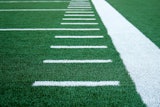Female athletes may be at risk for more severe concussion symptoms and longer recoveries due to the fact that they wait longer than their male counterparts to be seen by a specialist.
A new study from the Sports Medicine Program at Children’s Hospital of Philadelphia reported the findings after it analyzed electronic health records of sports participants aged 7 to 18.
“There is speculation in the scientific community that the reasons adolescent female athletes might suffer more symptoms and prolonged recoveries than their male counterparts include weaker neck musculature and hormonal differences,” senior author Christina Master, a pediatric and adolescent primary care sports medicine specialist and Senior Fellow at CHOP’s Center for Injury Research and Prevention, said in a statement. “We now see that delayed presentation to specialty care for concussion is associated with prolonged recovery, and that is something we can potentially address.”
Related: Females More Susceptible to Soccer Concussions
The research team analyzed a dataset containing records of 192 children between 7 and 18 who were diagnosed with an sports-related concussion and seen by a sports medicine specialist. Females took longer see a specialist and had longer recovery trajectories than males. The median days to be seen for a subspecialty evaluation was 15 for females with a sports-related concussion and nine for males
CHOP says the delay is important, as the time to be seen by a specialized care greater than one week has been described as a factor associated with prolonged recovery.
Five distinct outcomes indicating return to preinjury function were measured to determine “recovery” in the group of athletes. By looking at average-days-to-recovery for female and male patients across these outcomes, researchers found that females returned to school later (4 vs. 3 days), returned to exercise later (13 vs. 7 days), had neurocognitive recovery later (68 vs. 40 days), had later vision and vestibular (balance) recovery (77 vs. 34 days) and returned to full sport far later (119 vs. 45 days).
Importantly, when researchers limited the analysis to those female and male patients that presented to the specialty practice for evaluation within the first 7 days of injury, the differences between males and females on all outcomes disappeared.
“It is possible that the lack of athletic training coverage at the time of injury may affect the time to concussion recognition during the first critical hours and days after injury,” says Master. “This period is a window of opportunity where specific clinical management, such as immediate removal from play, activity modification and sub-symptom threshold exercise is correlated with more rapid recovery.”





































